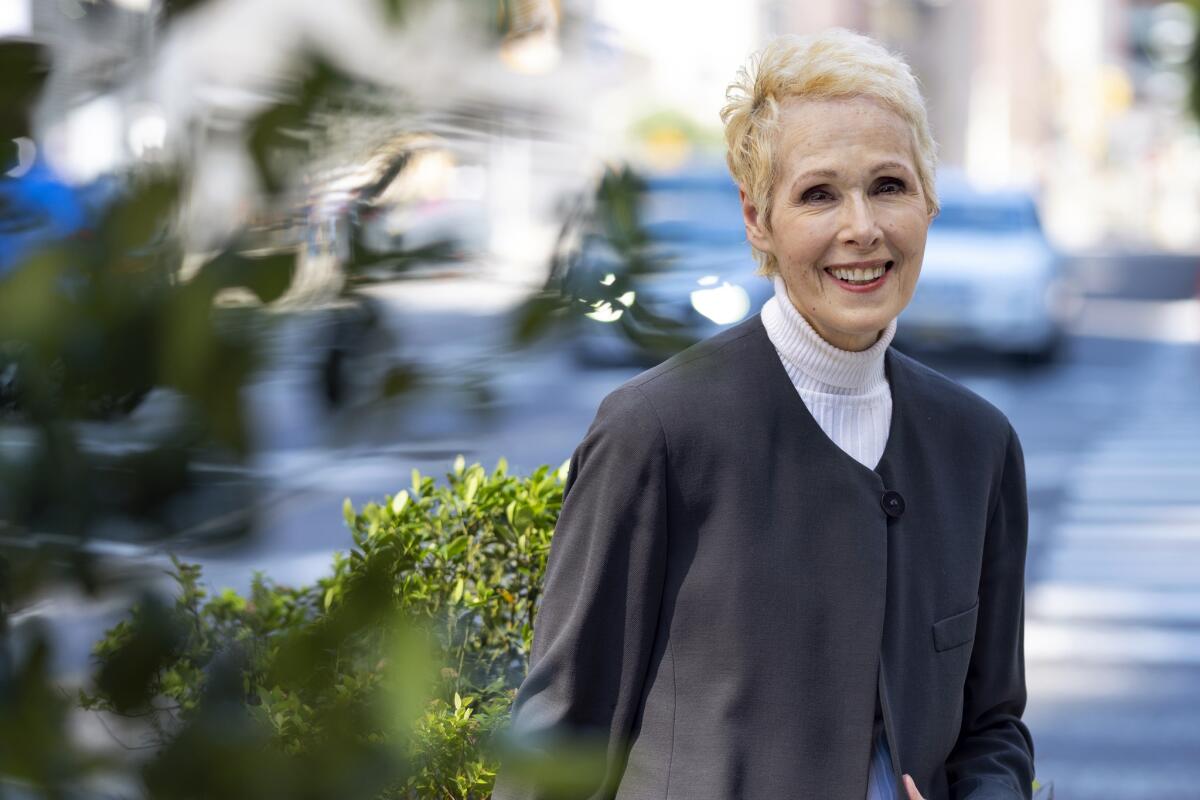Column: Trump stands accused of defamation. An obscure law may let him skate

In a strange twist of the legal system, the defamation claim by E. Jean Carroll, who alleges that President Trump raped her in the mid-1990s and lied about it in June of 2019, could come down to whether Trump was “acting within the scope of his employment” when he accused her of making false accusations and, for good measure, disparaged her as too unattractive to rape — “not my type.”
The Justice Department is arguing as much in federal court as it seeks to take control of the suit. If the DOJ’s motion succeeds, the effect will be to throw out the case, letting Trump skate.
For those appalled by the many accounts of Trump’s abusive behavior toward women or alarmed at Atty. Gen. William Barr’s willingness to treat the president as the DOJ’s client, this turn in Carroll’s case is one more outrage. For them, Trump’s conduct is obviously personal, not related to official state business, and not within the scope of this or any president’s job.
The distinction is crucial because, in another odd stroke of the law, if the “scope of employment” motion holds up in court, Carroll’s case will fall under the Westfall Act, a law that converts tort lawsuits that arise in the course of federal employees’ work into suits against the United States government, which steps in and defends the claim.
The additional rub is that the United States, as a sovereign, can decide what it can be sued for. Defamation — an intentional tort, as opposed to, say, an act of negligence — is not on the list.
How all of this exactly applies to Trump is more vexing than it is clear. He’s not your usual federal employee. And fitting the “scope of employment” idea to his situation is further complicated by his defining tendency to equate his personal interests with his official duties.
E. Jean Carroll’s defamation suit against the president has been bigfooted by the Justice Department, making the U.S., not Trump, the defendant.
Carroll’s lawyers, not surprisingly, see the issue as crystal clear. “It is inconceivable,” they wrote in their brief, “that Trump’s employers — a.k.a., the American people — expect his job to include viciously defaming a woman he sexually assaulted.”
Well, yes, but tort actions over employee conduct are almost always about behavior the employer didn’t expressly authorize. An Amazon driver’s job isn’t to run a stop sign and plow into another vehicle, but it is uncontroversial that if an accident happened during the driver’s deliveries, or on his way to and from work, it would be considered in the scope of employment.
As to the particular matter of elected officials and their duties, tort cases, including defamation cases, have been mounted against members of Congress.
For example, students at Kentucky’s Covington High School sued Sen. Elizabeth Warren (D-Mass.) for defamation over social media statements she made related to a standoff at the Lincoln Memorial between the students and a Native American. The courts held that Warren’s statements — which called the students’ conduct “hateful” — were part of the job of a public servant commenting on public matters. The Westfall Act applied. The case was tossed out.
More on point for Carroll’s case, the courts came to the same conclusion about a member of Congress — Cass Ballenger (R-N.C.) — who, in explaining his marital problems to his hometown newspaper, said his wife was “bugged as hell” because they lived near the offices of the Muslim nonprofit Council on American-Islamic Relations, which he characterized as a “fundraising arm” of a terrorist organization. CAIR sued, but the court decided Ballenger’s statements fell under the scope of his employment: “The Congressman was acting, at least in part, for the purpose of preserving his effectiveness.”
Carroll’s defamation claim is built on three Trump statements in which, among other things, he denied the rape charge, called her a liar, said he had no idea who she was (despite a picture of them in a small group together) and implied that she had various ulterior motives — selling a book, being in cahoots with Democrats. He told the publication the Hill: “I’ll say it with great respect. Number one, she’s not my type.” Almost by definition, his remarks seem to satisfy a public interest test.
But the Department of Justice can additionally argue that while the president was responding to charges that called into question his personal character (and were related to events that happened before he was president), he was also responding to an attack on his fitness for office. Or, as the department’s brief puts it, quoting from another Trump court case, “Due to the nature of the position, ‘there is not always a clear line between his personal and official affairs.’ ”
Until the DOJ’s motion was filed, Carroll’s suit had advanced in New York courts to the point where Trump could have been required to sit for a deposition or provide a DNA sample (which might match one taken from the dress Carroll says she wore when she was attacked). Now the case rests with Lewis A. Kaplan, a thoughtful, well-regarded judge in the U.S. court for the Southern District of New York.
As galling as it will be to Carroll and anyone who hoped her lawsuit would call Trump to account, Kaplan may be hard-pressed to deny DOJ’s claim and let the defamation case be decided on its merits.
@HarryLitman
More to Read
Updates
3:23 p.m. Oct. 21, 2020: An earlier version of this op-ed said the Department of Justice argued its position on Carroll’s suit in federal court today. Instead, it asked the court to rely on its written submissions.
A cure for the common opinion
Get thought-provoking perspectives with our weekly newsletter.
You may occasionally receive promotional content from the Los Angeles Times.











